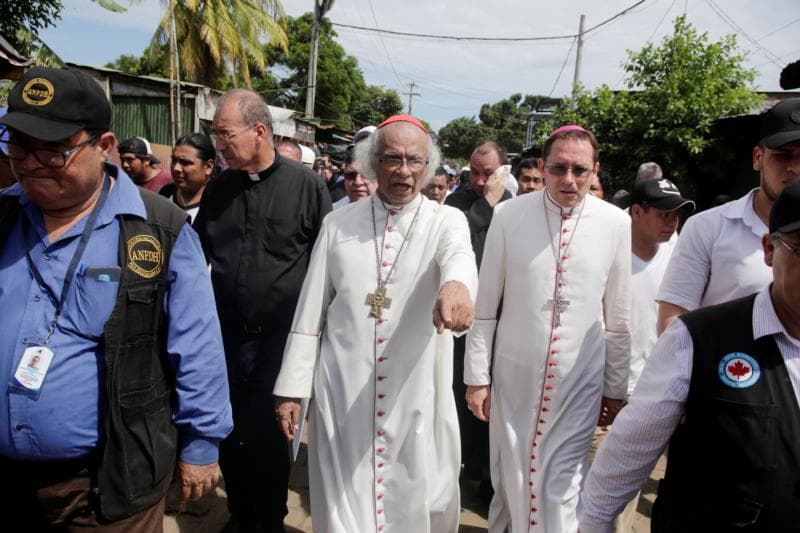ROME – As the United States debates sanctions against Nicaragua for the imprisonment of an opposition leader by President Daniel Ortega, two of the countries leading Catholic bishops are demanding the regime cease the “exclusion of the adversary.”
Cristiana Chamorro is not the only candidate in Nicaragua’s Nov. 7 presidential elections to be harrassed last week: Arturo Cruz was also prosecuted and sent to prison, and Felix Maradiaga of the National Blue and White Unity (UNAB), was summoned to the prosecutor’s office.
A law passed by the constitutional assembly late last year stipulates a wide range of actions including supporting civic protests against the government can lead to a person being labeled as a “Traitor to the Fatherland” and be banned from public office.
Cardinal Leopoldo Brenes, archbishop of Managua, gave no names when he said on Sunday that the devil wants to hinder the work of those who have worked to do good in Nicaragua, and called on the populace to “not to listen to those voices that preach violence, not to listen to those voices that preach division, not to listen to those voices that preach confrontation, those voices that preach to discard the other. That is not of God, that is not of the Spirit.”
“Let us not be discouraged, let us go forward to build a country as the Lord wants it: A country in communion, in unity, in which all of us can listen to each other and discard the negative, accept the good,” the cardinal said.
Referring to the process against Chamorro, he called on the authorities to make “fair decisions attached to the truth.”
She’s accused of money laundering, and was placed under house arrest hours after she announced her plans to run for president.
“(Pray) for all our judges in the delicate mission of imparting justice, so that all may be led by the spirit that always leads us to the truth, so that all their judgments and decisions are attached to the truth,” Brenes said.
Previously Brenes said that he has heard “the concern of many brothers, who with great sadness see how many of our citizens are being called and interrogated.”
In the last two weeks, the Attorney General’s Office has summoned and “interviewed” 45 citizens in relation to an investigation for alleged money laundering against the now closed Violeta Barrios de Chamorro Foundation (FVBCh), of which Cristiana Chamorro was president.
Bishop Rolando Alvarez, from the Diocese of Matagalpa, said during his Sunday homily that “one cannot live excluding the other, censuring and discarding the adversary because then politics is militarized and stripped of its true sense, which is the search for the common good; and we put the country on the edge of a devastating dynamic.”
He recommended “to stop looking back, to stop anchoring ourselves in the past without learning from it, because we would be mortgaging the future of our people, especially the poorest and weakest who pay higher costs.”
“Above all, political actors must learn to cultivate tolerance, respect the criteria of others and avoid excluding them,” he said.
Alvarez warned that “Nicaragua must find the commitment to the creation of a new nation, of a functional state, based on the division of powers, respect for human rights, legal security for the individual and economic investments and a democratic system based on a transparent, fair and free suffrage. Respecting this commitment augurs a great and prosperous country, otherwise we would be condemning it to poverty and misery.”
The auxiliary bishop of Managua, Bishop Silvio Baez, who’s been exiled in Miami since late 2018, said in his homily that “evil does not have the last word, the unjust and violent will not prevail. God will do justice to the victims and will give us all life forever.”
“In this moment that we Nicaraguans are living, in this moment that the world is living, convulsed by so much war, so much violence, and that although it gives the impression that we are going in a tunnel with no exit, I do not think so, we have to be men and women of hope all this is transitory,” he said.
Known for being one of the most outspoken voices against Ortega, Baez had previously gone to Twitter where he called the situation in Nicaragua “very worrying.”
“The dictatorship is increasing its repression every day and is ready to do anything to prevent free elections. Let us not lose hope. Let us believe in the strength of truth and solidarity and let us remain united. God bless Nicaragua,” he said.
Once a revolutionary junta leader, Ortega has gradually dismantled the country’s democratic institutions and stifled dissent since he returned to power in 2007 in democratic elections.
A civic uprising that began in April 2018 was brutally put down, with at least 320 people, mostly protesters, dead as a result of the repression.
Follow Inés San Martín on Twitter: @inesanma












